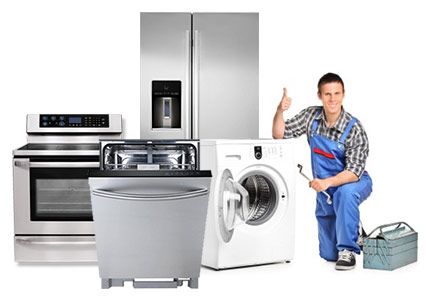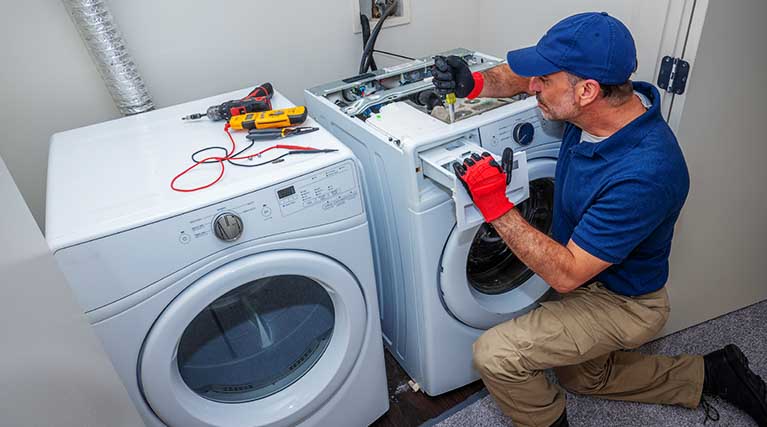The Ultimate Guide to Comprehending Home Appliance Fixing at Home
When your fridge quits cooling or your stove refuses to warm, it can feel overwhelming. Recognizing home appliance repair in your home can save you time and cash. You'll learn to identify signs, use crucial tools, and comply with a methodical troubleshooting procedure. But prior to you begin, there are critical security precautions you require to take into consideration. What are the most typical issues, and exactly how can you repair them? Let's discover the essentials.
Common Appliance Troubles and Their Signs
When your appliances begin acting up, it's crucial to recognize the indications at an early stage. Disregarding them can result in larger concerns and pricey fixings. For example, if your refrigerator isn't cooling down effectively, you might see warm places or condensation developing. This could show a failing compressor or an obstructed vent.Your dish washer may reveal problems via unclean recipes or uncommon noises throughout cycles. If you listen to grinding or clanking, it's time to investigate.A washing maker that will not rotate or drain can leave you with soggy washing, recommending a clogged drain or a malfunctioning pump.Lastly, if your oven's temperature seems off or it takes for life to preheat, you might be managing a faulty thermostat. By remaining sharp to these symptoms, you can address problems prior to they rise into significant repairs.
Crucial Tools for Device Repair Work
When you're taking on home appliance repair work in the house, having the right devices is necessary. Standard hand devices like screwdrivers and pliers will certainly aid you disassemble and repair numerous devices, while electrical screening gadgets guarantee you're working securely with wiring. Allow's look at what you require to start on your repair journey.
Standard Hand Tools
Having the right devices is important for reliable home appliance fixing in your home. Begin with a dependable screwdriver set, including both flathead and Phillips kinds, as screws are typical in appliance assembly. Pliers are additionally vital; they aid with gripping, turning, and cutting cords or little components. A set of needle-nose pliers can get to tight places quickly. You'll need an excellent adjustable wrench for tightening up or loosening nuts and screws. An energy knife is useful for cutting via product packaging or insulation. Don't fail to remember a sturdy workbench or surface to safely arrange your tools and components. With these standard hand devices, you'll be well-prepared to deal with most device repairs that come your means.
Electric Testing Instruments
Alongside fundamental hand devices, electric screening gadgets play a necessary function in home appliance repair work. These devices help you diagnose electric concerns and assurance devices function securely. A multimeter is crucial; it gauges voltage, present, and resistance, permitting you to identify troubles promptly. A non-contact voltage tester is one more essential, allowing you find real-time wires without making direct contact, boosting your security. Secure meters are terrific for gauging current circulation in cords without detaching them, conserving you time and initiative. In addition, circuit testers can promptly check if outlets are functioning correctly. By making use of these gadgets, you'll streamline your troubleshooting process and improve your repair service skills, making appliance maintenance a lot much easier.
Step-by-Step Guide to Diagnosing Appliance Issues
When your home appliance acts up, it can be frustrating, however diagnosing the concern does not need to be overwhelming. You'll learn to recognize common troubles and apply effective fixing strategies. Allow's go through the steps to obtain your home appliance back in working order.
Common Appliance Issues

Repairing Techniques Described

Repairing Major Cooking Area Appliances: A Closer Look
Have you ever before wondered just how to deal with typical issues with fix dishwasher your kitchen area home appliances? Fixing significant kitchen home appliances like refrigerators, ovens, and dishwashing machines can be less complicated than you think. Begin by identifying the trouble-- whether it's a refrigerator not cooling down or a stove that will not heat up. Commonly, a basic reset or inspecting the source of power can address the issue.For fridges, clean the condenser coils and inspect the door seals. If your stove's not home heating, evaluate the burner and thermostat. Dishwashers might simply require a tidy filter or a reset to get them back at work. Constantly disconnect the device before diving into fixings to guarantee your safety.Don' t fail to remember to consult the user guidebook for certain repairing suggestions associated with your design. With a bit of patience and the right tools, you can with confidence tackle home appliance repairs and conserve cash in the process!

Troubleshooting Laundry Devices: Tips and Techniques
When your washing appliances start acting up, it can feel overwhelming, but troubleshooting them doesn't need to be a headache. Beginning by inspecting the power supply. Verify the device is connected in and the electrical outlet is functioning. Next, check the door or lid button; a faulty button can stop the equipment from operating.For washing machines, if it's not rotating, look for unbalanced tons. Rearranging the garments could solve the concern. If your clothes dryer isn't heating, tidy the dust filter and examine the vent for blockages.Listen for uncommon noises; they can indicate an issue. If your appliance is leaking, inspect the pipes for cracks or loosened links. Document any type of error codes displayed on electronic displays, as they can assist you in recognizing the problem. Speak with the individual handbook for specific fixing ideas connected to your model.
Security Preventative Measures to Take Throughout Repair works
Prior to you start any home appliance repair services, it's important to prioritize security to stop mishaps or injuries. Disconnect the appliance or transform off the circuit breaker to assure no power reaches it while you work. Use insulated tools to decrease the danger of electrical shock. Put on safety and security goggles and gloves to secure yourself from sharp sides or debris (Washer dryer repair service Dependable Refrigeration).Make certain your office is tidy and well-lit, so you can see what you're doing. Keep youngsters and pets far from the area to avoid disturbances and potential hazards. If you're dealing with gas devices, be added careful; look for leakages prior to proceeding.Take your time, and don't hurry with repairs. If you really feel unclear about any kind of action, it's far better to pause and study than to think. Complying with these preventative measures will certainly aid create a safer environment for your DIY appliance fixing job
When to Call a Professional for Help
Exactly how do you know if it's time to call a professional for device repairs? If you've attempted basic troubleshooting without success, it's a clear sign. For example, if your appliance still won't start or reveals unusual sounds after resetting it, do not think twice to seek expert help.When you discover leaks, smoke, or shedding scents, focus on safety and security and call a professional instantly. These concerns can result in more substantial damages or pose threats to your home.Also, if your home appliance is under guarantee, contacting a specialist is usually the most effective course. They can ensure that repair work will not invalidate your service Read Full Report warranty, conserving you cash in the lengthy run.Finally, if you're unclear or uneasy with complicated fixings, it's smart to leave it to the specialists. Keep in mind, dealing with challenging issues without the best competence can bring about expensive errors. Depend on a professional when in question!
Often Asked Inquiries
How Can I Prevent Device Troubles in the Future?
To avoid home appliance problems in the future, you ought to execute regular upkeep, look for deterioration, tidy filters, and prevent overloading. Remaining aggressive will aid prolong their lifespan and maintain them running smoothly.
What Are one of the most Usual DIY Device Repair Work Mistakes?
You may ignore security preventative measures, miss troubleshooting steps, or use incorrect devices when attempting DIY appliance repairs. Rushing the process or overlooking supplier guidelines can lead to more substantial problems and expensive blunders. Remain individual and notified!
How Do I Know if a Part Requirements Substitute?
You can tell if a part requires substitute by checking for unusual sounds, leaks, or irregular performance. If the device has a hard time to operate appropriately or shows visible damage, it's most likely time for a substitute.
Can I Make Use Of Generic Parts for Device Fixes?
Yes, you can use common components for device repairs, however determine they work - Dependable Refrigeration & Appliance Repair Service Dryer repair near me. Common parts might conserve you money, yet they could impact efficiency or longevity, so consider your choices thoroughly before choosing
What Service Warranties Cover Appliance Repair Works?
The majority of appliance guarantees cover repairs for making defects, but they commonly leave out damages from misuse. Check your service warranty terms very carefully, as some could call for making use of qualified professionals and original parts for insurance coverage to remain valid.